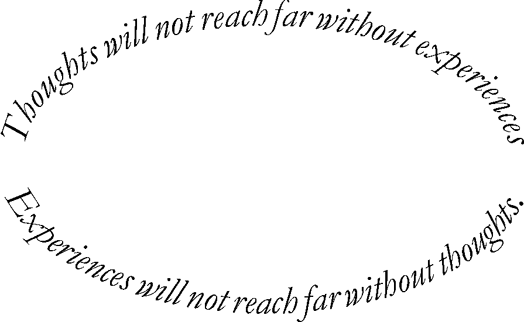
The Isaac-project has led to the fact that example after example have been told by
participating personnel. The new concrete can be a way to give the mind fuel and inspire
it to browse among your own experiences. Thoughts were brought from concrete occurrences
and could at best give a connection between them. Experiences need thoughts to lead on.
The dependency is mutual.

Very often knowledge coming from experience is deported to one out of two unsatisfying places: to stay only with the separate individual or to be split into separate expert-knowledge. The first is a waste of resources. The latter is unsatisfying and dangerous if it stands alone. Expert-knowledge is formulated not only on a different language but by people who have limited experiences about the every-day life in the care of differently abled people.
Think about Stina for example, who works in a group-living. She is very competent and has invented a lot of practical methods that works well. How can Stina's colleagues take part in her experiences on how to meet destructive behaviour? It is not reasonable that hundreds of employees, working with self-destructive people, shall have to start from the beginning and search for methods. Stina's experiences should have the possibility to meet Lisa's and Pelle's and become an every-day theory which could be used more generally.At present time the case is probably that Stina, if we are lucky, tells a few colleagues, a psychologist and a care officer. The psychologist and the care officer meets a hundred Stinas. At the end they can condense the knowledge they have gathered, and try to mediate it. But they will tell it in their language, a language with other expressions and theories than that of every day life. If you want to introduce technology this language will not do. Technology belongs to practical life.
Within a field like the care of differently abled people, where the knowledge coming
from experiences as well as expert-knowledge is about people whose worlds we only have
partly knowledge of , the confusion of languages can be total. It is almost like the story
about the scientist who, at a dinner-party, should explain the theory of relativity to a
very persistent lady:
"A blind man and a sighted man walked on a very hot day along a main road.
The sighted said: If I only had a glass of milk!
The blind: I know what a glass is, but what is milk?
The sighted: Milk is a white liquid
The blind:I know what liquid is but what is white?
The sighted: White, that's the colour of a swan's feathers.
The blind: I know what a feather is but what is a swan?
The sighted: A swan is a bird with a curved neck.
The blind: I know what a bird is but what is curved?
The sighted then took the blind man's arm, stretched it and said: this is straight.
Then he curved the blind man's arm and said: this is curved.
Whereupon the blind man enthusiastically shouted: now I know what milk is"
The blind man in the story never learned what milk is, and the persistent lady never
learned anything about the theory of relativity. Thoughts do not reach far without
experience. But where experience exists, example can lead to example, and to patterns and
safety. In this chapter we emphasise a dozen examples that according to our experiences
lead on. Our reasons to pick just these 12 examples you might not see until you read the
summary at the end of the chapter. But maybe you find another pattern?
"A female staff-member stood inside a bathroom with a person and tried to make him
pull up his pants. He was deaf, so she pointed at his pants on the floor. He didn't
understand. She tried again and pointed at the pants. Not a movement. Then she got an idea
and pointed at the pants and then upwards. The reward was that he, not only, put on his
pants. He also smiled, which is very rare."
When this story was told, another member of the staff remembered how she, out in the woods, had tried to get a differently abled man to climb over the bushes at the side of the path and walk up to her. He did not understand. She lifted her leg again. He still did not understand. Finally she took a real step forward with her leg high up.
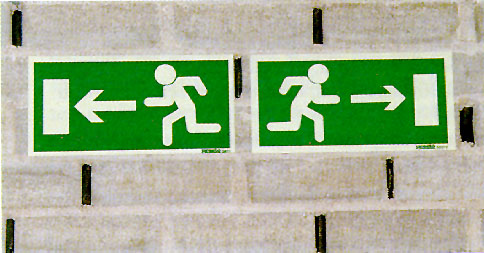
Guiding or confusing information?
He immediately understood and took a step over the bush. Only because the story about
the pants was told, the story about the step over the bush was actuated. One story was
linked to another and became, in this case, a living theory: look at yourself and try to
understand how (un)logical your message is when you try to show another person a movement
moment!
To show movement-directions and step-movements is relatively easy. Think how much more
difficult it is with things we ourselves hesitate about. Our attitude towards death for
example. Differently abled people often look upon death in a more concrete way than we do
and therefor have bigger as well as smaller problems:
"An employee on a day-centre recently died. A woman who had known him wondered when the statue of the man should come, and where it should stand. She had the idea that the body, after death should be immured in a statue of stone. She knows that kings "stand statue" in Stockholm."
"The mother of one of my pupils suddenly died. He knew that she was dead but two
days later he phoned to his mothers short-number all evening. When I arrived he was very
anxious about taking his mothers number away. Naturally he could not imagine what it
looked like in the other end of the line. Although he knew that his mother was dead it
might happen that he anyhow could be able to talk to her when he dialled her number. He
had to know what was going on somehow."
Together these examples can lead to more general presumptions that differently abled
people make conceptions of their own about what it is like to be dead. Conceptions that
are totally tied to the body and which they sometimes need help to evaluate.
"In my group-home we usually tried to get the applicants to the house when the pupils were at home.
Sara, one of the pupils, used to take the applicant by the hand and drag her in to the shower-room. In there she took of all her clothes and demanded to be showered.
This behaviour made a lot of the applicants a bit confused, and they came out asking if it was OK to give Sara a shower in the middle of the afternoon. We said it was OK. Afterwards Sara used to come out with an absolute soaking wet applicant. With mimics and noises she showed what she thought about the applicant. That this was her way to test the applicants I did not understand immediately. But after a couple of showers I discovered a pattern in Sara's way of acting and understood how smart she really was.
To help a person to take a shower really shows what kind of helper we are, and that was what Sara had discovered. "Will she let me feel the temperature of the water before she puts me in the shower? Will she put on plastic gloves on herself, or even two pair of plastic gloves? Will she use the soap or the face-flannel? Will she scrub me or will she be careful? Will she make sure I do not get any shampoo in my eyes? How does she do when she washes me between my legs- does she seem uncomfortable? Is she afraid of getting water on herself? Does she think it is cosy or does she look at it like a hygienic emergency situation? Did she make sure the towel was on the radiator, so it will be warm when I shall dry myself? I think Sara got the answer to these questions and many more in that shower -room. There were the underlying reasons for her facial expressions afterwards.
Unfortunately the labour legislation's made it difficult for us to take the person Sara
recommended . But I always tried to. With the results in hand I can say that Sara's
shower-test often was more accurate than our usual tests."
Every night before he goes to bed a differently abled man draws a picture of a woman in natural size. Then he takes the drawing with him in the bed. In the morning when he wakes-up he crumples "her" up in the wardrobe.
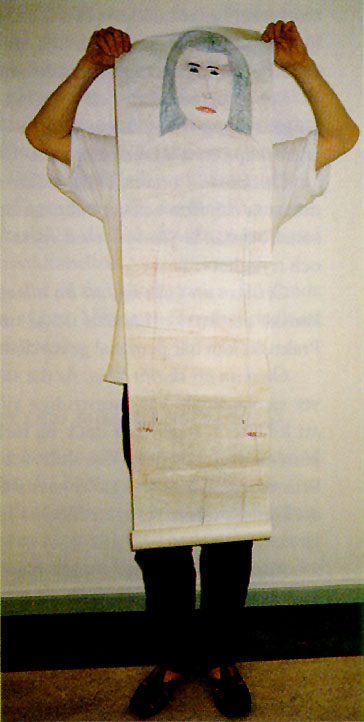
This picture is made and used by a differently abled man.
She is used. Next evening he draws a new picture. He diversifies the woman's looks. Sometimes she is plump and dressed in a gown, sometimes thin and dressed in a very short skirt. Sometimes she has a punk hair-cut, sometimes long black hair.
Our informant believed that the man maybe become tired of having the same girl all the time. Do you think he is happy with his paper- dolls, or is he making signals that he is looking for support to gain a better sex life? One person who has been in contact with CERTEC's expert system Svarne ( see page 140), which tries to structure and be a mind-support and a decision aid in violent situations, was inspired to try to structure thoughts about sexuality in a similar way.
He believed that such a structure of thoughts should improve the environment's possibilities to support differently abled people's sex life. The sexual is not a unity, he said. It contains:
Need of friendship and assurance. If this is dominating, the environment's task is to hug and fondle, and create an allowing atmosphere.
Wish for masturbation. Then it is about giving the opportunity to dream, look andto allow loneliness, that is completely the opposite procedure compared to the former clause, "need of friendship and assurance".
Wish to get married, and live together with someone else. Then it probably is very much about a will to make it on his/her own. Practically the personnel can give a lot of support in this matter.
Wish to have children. If you also need help with the sexual intercourse a lot of conflicting opinions will clash. No one has ever lost anything because of the fact that the wish to have children has been made conscious and been separated from the wish, for example, to masturbate.
Moral: also when it comes to sexuality it is important to split, to get under the surface, to try to understand what it is all about.
An even more important moral: you have to make sure that differently abled people have the possibility to have an emotional life. Once, when Arne Svensk was new as a manager, a mother called him up and told him she was sorry because her daughter Lena, who was in love with a boy, Sven, in Lund, now had to move. The reason for this was an administrative rule that said you had to move back to your home-town when you had finished special school. Lena was now 21-years old and on her way back to Eslöv. Something she absolutely did not want to do-she had her boy-friend as well as her whole circle of acquaintances in Lund.
Everybody who knew Lena and Sven understood that their relationship would fade away if she moved the 20 kilometres to Eslöv. Both of them should have problems with telephones and watches and bus timetables and train timetables and everything else that has with communication to do. Already to meet in Lund demanded participation by personnel in the two separate group-homes. Quite often even friends in the group-homes became involved as the personnel could not assist only Sven and Lena.
Those who wanted to help Lena and Sven tried in many conferences to point at the preposterous that a paragraph should, in actual life, break a relationship between two persons that were very fond of each other. Other people held back and meant that you exceeded the personnel's authority if you interfered in love-stories
"They have to take care of that on their own, everyone else has to." said a teacher. As if love should make you understand the watchor the bus timetable better.
Finally this story had a happy end. They could move-in together, and everything turned
out to be so fine, so fine. The story deserves however to be held alive for
second-thoughts.
Sometimes examples can be brought outin connection to guidance of personnel. Everyone who is involved can have a feeling that they have been asked to do something they do not understand or can. Someone says:" I cannot work with him when he is so sad". This is a point when everything loosens up and the examples starts to come and you can help each other a lot.
You must try to separate personal weaknesses and contextual. Otherwise no one dares to say anything, everyone just feels stupid.
Some subjects cause more problems than others to differently abled people (and
therefore also to the personnel). These problems often have to do with money and time.
Here are two examples on how you can accentuate the money- , time perception.
Below a conversation is rendered about what two persons
(B and C) answered when A (Arne) asks them about money.
A: Do you have to pay for the food?
B: Yes, I think you have to do that.
A: Do you have to pay for water?
B: Yes, a little I think.
A: Why do you have to pay for things?
B: That is difficult to say, but you have to do it.
A: Try!
B: You have to do it because you shall have it together with everybody else.
A: Why do you have to pay in the store? Why do you have to pay for the milk?
B: Yes, the milk costs, because we all help one another to drink the milk.
A: But if you live on your own, why do you then have to pay?
B: Well, that is probably because he is alone he has to pay for himself.
A: Why can'tthe milk be free?
B: Yes, you cannot have that today.
A: Yes, but certain things you do not have to pay for, for example to cross a lawn. What
is the differences?
B: Yes, you can ask yourself what the differences are. Maybe you do not have to pay for
walking on a lawn. It depends on whether there is a path to walk on.
A: Why is air free?
B: Yes, you can ask yourself that. It is because it is so warm, the air. It warms things
up when it is summer.
A: Why is it free when it heat things up?
B: Yes, tell me.
A: Why are some things for free and some things not?
B: Certain things cost money, because you have to shop. It is different with the air. It
is because it is energy and stuff. All energy comes from Barsebäck. ( Swedish nuclear
power station)
A: When you pay, will the money then go to Barsebäck?
B: Yes, I do not know if it does.
A:What does " it is free" means?
B: Yes, tell me.
A: Do you have to pay much or little money if it is free?
B: Yes, it cannot be free, because that is expensive.
A: Do you have to pay anything if it is for free?
B: Yes, I do not know what it is like.
A: What do you think?
B: Yes, you have to pay if it is for free.
A: Who decides, in the shops, how much it shall cost?
B: Tell me, it is difficult to say. It is probably the higher au-horities.
A: Shall a bicycle cost more than milk?
B: Yes, they are all together, because it is the VAT and everything, light and rear light
and generator and everything, and it is expensive and exchanges. It is expensive today.
And this is how "C" answered:
A: Do you have a bank-book of your own?
C: No. I have, you know, bits of paper you canwrite on. Cheques.
A: Can you fill in the cheques yourself?
C: Yes.
A: But if you fill in the cheque wrong, for example if you write that you want a million,
does the bank give it to you then?
C: I do not know.
A: But the money, how much money do you fill in?
C: Three!
A: What does it mean when you say that things are expensive?
C: Everything is expensive.
A: But what is expensive?
C: VAT and gas can be expensive.
A: But what does it mean when you say that things are expensive?
C: Then you will not have to buy anything.
A: Mention something that is cheap.
C: Fish- fingers and chips.
A: Mention something that is expensive.
C: Lemonade.
A: Is there anything that is expensive in your apartment?
C: I do not remember that now.
A: Is there anything that is cheap in your apartment?
C: You have to pay it.
A: Are you rich or poor?
C: Rich.
A: And the food at your job, do you pay it by yourself?
C: Yes, 36.
A: Does everyone at the job earn as much money as you do?
C: Yes, absolutely.
A: So the boss is also earning£400?
C: Yes, absolutely.
A: Does love cost anything?
C: Ha, ha, ha, ha. Love! No it does not!! Ha, ha, ha.
A: What is it that makes it so good to let your parents take care of your money?
C: I pay the rest myself, then they pay the rest to me. Otherwise it should be to
complicated.
A: Are you afraid that thieves shall take your money?
C: Yes I am. Those upstairs! I have not got my money back yet. They begged. I told them I
should use it myself, but they wanted to borrow.
A: How do you do when you "borrow"?
C: Then you just say nope, not a cent!
A: Do you know what the things cost, if you look at the price label in the shop?
C: Not really. You have to "price" it first, then you can see what it costs.
A: But if there are red labels on the things, what does that mean? (In Sweden that is a
signal for cut-price article)
C: Then it is expensive.
A: Why is it expensive with red labels?
C: Because then it is EXTRA-PRICE!!
Without intimate conversations, as the one above, it is likely that the environment
misinterpret a lot of the differently abled people's problems with money.
There exists a lot of examples on how technology can make the personnel's assignments different, more challenging and more exciting. We shall now give an example on how you can use an expert-system (see page140) to help you when you shall make a judgement about the ability profile.
With a relatively small effort (as a project-work in a CERTEC-course in rehabilitation technique) two students, Per Flock and Kjell Jönhede, tried to use an expert-system for analysing how differently abled people think about time.
They sent out a questionnaire about time to eight day-centres in Malmö county council. The questionnaire contained 21 questions that the differently abled person should answer. The personnel got instructions on how they should act and they should also write down if they considered the questioned person to be on a B- or C- level ( according to G Kyle´ns definition), that is if the person was moderately or mildly retarded.
The reply-frequency was very high and according to the personnel, those who had answered the questionnaire had experienced it as very exciting. This was obvious from the questionnaires we got back. All questions were answered, no one had been bored during the task.
We took a certain numbers of the questionnaires and used them to "teach" the expert-system. This created a picture (with a certain variation) of "this is how a person on a B-level answers this question". Then we used the remaining questionnaires to test the expert-system: were really these answers sufficient to give the same ability-judgement as the personnel did? It turned out that the expert-system made the same judgement as the personnel in 22 cases out of 26, that is 85%.
Naturally you cannot make any considerable conclusions ofsuch a simple and short
project, but we think we got some answers:
We come to the conclusion, through the expert-system, that there are two questions that seem to be the most distinctive ones when it came to decide-level.
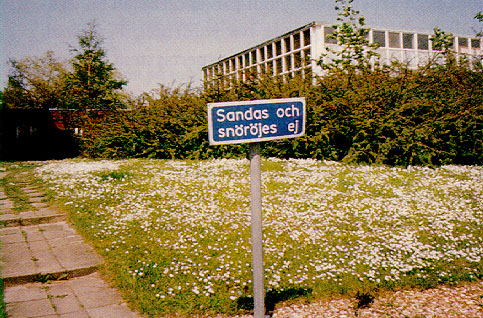 |
All questions (and answers) are not needed. At least not always. In summer it is not important to put sand on the road. And in our questionnaire two questions alone turned out to be almost completely decisive. |
| The text on the road sign says: "No sanding. No snow clearing". | |
If you now make similar questionnaires for perceptions, cause and effect, quantity and quality, you should probably within those subjects be able to find the most critical questions as well. By putting together the most distinctive questions within each category to one questionnaire you should probably be able to present a test- instrument that is quick and easy to use for personnel in the group-homes or at work.
Such an instrument should be very valuable. Experience shows that personnel have a very high degree to make judgements from what a person can accomplish in routine-tasks, and therefore systematically land higher up on the scale than he should do if you took into consideration how he reacts or thinks in unusual situations.
To invent an every-day test through an expert-system is not about replacing
psychologists when you will do ability-judgements. The test will only help the personnel
to make a judgement as realistic as possible of the persons cognitive ability and thereby
put their demands at the right level. According to the reactions (mainly positive) we have
received from the personnel that have helped us with the questionnaire we can draw certain
conclusions, among other things that it has brought forward a lot of aha-reactions for
those who have participated. For example: "I was very surprised that she did not know
the answer to that question, I was certain she knew it".
Certain examples have such a meaning they tend to come back to you.
Strong emotions are involved. You never forget them. They emerge from the heart at
different occasions, and ought to be on their own as something you have to think through,
something that demands consideration, something that horrifies but also something that can
give support, inspiration, comfort and will to help a fellow human being. Through
increased empathy as well as increased knowledge.
"Compassion without knowledge is meaningless.
Knowledge without compassion is dangerous."
Victor Weisskopf, physicist
We want to mediate three important examples: one from a mother, Annika Ärvström,
one from the special teacher Barbro Lindberg and one from Arne Svensk, then
fresh manager at a group-home.
The report below is written by Annika Ärvström, mother to Jonas:
An episode in December 1993
I prepared everything. I put all the spice-jars with their labels outwards. Picked
everything up, closed all the cupboard doors very carefully, made sure that the catch on
the windows were cached in every direction. Put our shoes in line and with the
shoe-strings in the right direction.
Big brother Kinta had finished the usual macaroni-lunch and lit the candles. Actually I was very nervous inside because of this week-end.
I had been in a state of anxiety for days, because I knew that Jonas and I should be alone during the major part of the week-end. In spite of my anxiety I hoped that we should handle the situation very well.
I feel, when the mobility service arrives with Jonas, that now have we tried to do everything we can to please him.
Jonas is coming in, putting down his bag at the usual spot. Takes his clothes off and is looking quite satisfied.
My sons and I sit down to eat the macaroni- lunch. Damn- I have laid the table with cutlery which Jonas thinks is completely wrong. He gather them, walk to the cupboard and change them. He starts to be irritated and "burning candles- is not a part of my world", he seems to think. This particular day macaroni-lunch is not good at all. This is a bad omen! It remains quite peaceful until we leave the table. After lunch Jonas always hands over his plate to me so I can put it in the dishes.
Now I make a big mistake again. Big brother takes his plate and it all turns out wrong, so wrong. Mother Annika is supposed to do that. Why cannot I have a sixth sense so I will not end up in situations like this?
The bad humour is now a fact, and big brother is leaving as planned. Kinta has not yet understood how terrified I am to be alone with Jonas. What kind of mother wants to admit that she is afraid of her 14 year-old son and cannot handle him? Now is the moment of truth. Jonas and I are totally alone. I try to get Jonas to do a jig-saw puzzle and paint etc. He just glares at me with his green eyes and puts the things back where they should be.
I am now very scared and very careful not to be in a corner or turn my back towards him. I try to be calm- but Jonas is as if he was equipped with antennas. He easily looks me through and sees how scared and uncomfortable I am.
I now try the next trick. Candy and lemonade in front of the TV-set. Jonas seems to be quite satisfied. He arranges my feet parallel on the coffee table and gives me a news paper.
Lovely- a feeling of harmony and calmness is spreading. There is hope that we shall be able to handle this evening after all.
Suddenly the phone is ringing - not good! For different reasons I have to pick it up. It is a friend of mine, and I find it difficult to end the conversation quick enough. I am walking and talking at the same time in my wire-less phone.
Then itjust says bang, and my head is aching. Jonas is knocking me down. I fell headlong to the floor and hit the back of my scull. I was unconscious for a while and woke up because Jonas was standing up and kicking me in my face. I pulled myself together and after a lot of trouble got my hands on Jonas' tranquillisers.
After a while Jonas is very sad. His tears are flooding. We both are now very sad and unhappy. I went to look myself in the mirror. Not exactly a beauty. A big thick swollen lip and a lot of effusions in my head.But the visible damages are nothing compared to the mental ones. I feel so completely sad, failed and alone.
One of my friends call me up. He cannot help me now but some other time...Completely desperate I call the "short- time group-home" where Jonas is staying, but they cannot take him. They think I shall demand Police assistance to the children's psychiatric clinic. I cannot do that! Jonas would feel terrible, and I would have my nerves completely wrecked.
I speak to Jonas although I know he is absolutely deaf. I say: My son- at this moment there are only you and I in the entire world. We have nobody to trust except ourselves-not a single person exists now- but maybe later or some other time.
Spring 1994
After this occurrence I trembled like a aspen leaf every time Jonas was at home. Our social officer talked to the regional social insurance office and requested personal assistance for Jonas according to LSS. The answer was NO. The reason was that the regional social insurance office did not consider Jonas to be sufficiently handicapped! He is autistic, deaf, mentally retarded, self-destructive and aggressive towards his surrounding...
Thank God the handicap-secretary in our local-authority understood how serious the situation was after she had met personnel from the " short-time living", Jonas and I. Jonas was granted personal assistance every other week-end.
Our existence has been very hard. Jonas has felt bad and been aggressive. He has hit me as well as his brother. The personnel at the group-home have after years of hard battles become very tired, not to say exhausted.
My goal has been to take care of Jonas until he became 16 years-old and after that hand him over to a group-home with the feeling that I had done a good job.
Hard became the truth that emerged from my mental mind. Done a good job-NO-not at all! I could not stand up to my goal. I did not have the strength ! My resources were finished ! My mind was finished ! I felt like a total disaster as a mother to Jonas.
It was a very painful decision to make: Jonas can no longer live together with me.
Barbro Lindberg, child-psychologist and special teacher, has written the following
short-story (earlier published in Tobias and five other short-stories, Information-service
at the county-council in Jämtland):
When you talk about attitudes towards mentally retarded people and
their rights, it is not the seriously disabled or the multi-handicapped people you choose
as an example at first. But those people also exist, and they are many. Tobias is one of
them.
I am going to tell you a story.
It is about a boy who lived his life in a bed, and they immediately knew when he was born that he soon should die because his damages were of considerable proportions, as they said, and therefore he was nothing to bet on, they actually said so.
And it is true that you hardly could tell if he was alive, and when he died you hardly could not tell either. But when he was alive he was living and he kept on living and living and he became two years-old and several days, and maybe it was not visible from the outside but he knew a lot, at least so much that I cannot tell you more than a part of everything he knew.
He knewstillness for example.
He knew stillness and he knew movements, not movements from him, but he knew that movements existed, and big and small movements, there was a forward from where the air came towards him, towards him, towards him and there was a round, where the air rotated towards or against but just on one side. He knew that there was a there and back , where the air was against, with, against, with. Both there and thereandback could be smooth or jerky, but if thereandback was smooth it was like a rhythm everywhere, softswinging, swaying, it was best, better than gentle.
It also could be combinations, combinations ofmovements and gentle, there and back, up and down, to and fro, and the movements could be in separate parts in him or in all.
Different movements belonged to each other and different movements belonged to certain processes, he knew a lot. He knew that there, up in the air and down on the cold hard belonged to wet out-side and that a shellwas taken off and another was put on, and it was dry. And there he knew, when so long straight forward and then up, and down in soft but still leaned, belonged to tastes and spices and filling. And he knew that is was then you should open it, then it became full of hot tastes, he did not know when or the end, but he knew sometimes and maybe. And he soon knew that if you open it some other time some other place: not. He knew time, in a specific way he knew time.
He could wait.
He knew here and home, it was back again, it was the most familiar, his own smell, and hot and soft under and above almost all, sometimes happened that he felt something hard in one direction, but only sometimes, there was no pattern.
All other places were: there.
He knew darkness.
He knew there was darkness, but there was light as well, there was a grey that came sometimes, and there was a round yellow, round yellow, just occasionally. When it came he tightened his neck as if he tried to bring his head closer, but he could not do that. He did not know when the round yellow should appear, but afterwards there was always darkness, never grey. When it was gone he had no picture of it inside, or words, or thoughts, but when it came back he always recognised it and knew.
He knew scent.
Most of the scents came together with the taste and filling inside, but there were others that came with the peeling and the wet, and there were others to, he knew a lot of scents.
Different kind of scents were connected with different places, that were movements, that were quick or long, and quick or slow, and different scents were also connected with warm or cold, soft or hard, smooth or jerky.
There was a scent that was connected with close, surrounded, soft, warm, slowly, swaying and it did not come towards him in irregular puffs, but warm and regular, he could press himself a little closer, that was the best.
It did not come very often but when it did he knew it immediately and then he smiled.
Yes, he knew touches. Soft and warm and dry, wet caresses over all, hard short cold pinches that removed the scent and the breath when he did not want to open, because that happened too. He knew how he could make himself stiff and he could loosen up a bit too.
There were no sound.
There were shakings and pushes and violent wrenches, and long before he knew that soon it is movement and touching, he knew wet before, and scare and happy, and hungry, it came towards him on the floor.
There were scents and vibrations and surfaces he knew but could not place, they existed, they were familiar but without a pattern and coherence, they were not connected to anything, they did not do anything and they did not mean anything to him.
He did not care about them. At first he had been wondering, or curious or scared, but then he did not care.
There were things he was used to and things he recognised, but that wasnot very often.
But it happened sometimes, and one that happened never came back, but it existed as a certainty inside, a certainty that came sometimes, that: now. But then it went wrong and other things happened instead. But this certainty existed, and it took him through, through many days, it existed inside, as a joy, a longing, a sorrow. It had happened. It could happen again.
It did not happen.
But this time it happened it was hard and still, although not still, it was not thereand back but in some way thereandback, it was pushes and thumps and shakings in all, it went in and spread in all and stayed there and yet it continued to come more, it was completely new.
It was remarkable, it did not feel like anything, he was completely still, had he ever before been so still in his stillness, he received, received, he did not understand, he enjoyed, enjoyed, enjoyed, it existed, he existed, it existed within him and he existed in it, it was now and now and ever, it should never end, it ended.
It ended
He was waiting
He
was waiting.
Wai...
ti...
ng.
What a pity, they said, that he did not enjoy the music, did you see, he did not react
at all, although we put him just next to it.
Arne Svensk:
It was in the morning on the second day it happened. I had gota job as a manager at a group-home and would for three days work together with the retiring manager to learn the routines. After ten years within the special school this new work was a big challenge and something like a dream-job to me.
At the first day I met all the kids, and that was a very positive experience for me. Especially Sven, I felt that I got a good contact with. Lisa was sad because of the fact that the other manager should quit his job, so she pull off a big tuft of hair from my already thin hair to show how she felt about my presence. It took a couple of hours, and then she showed in different ways that I was welcome after all.
That felt good.
In the morning on the second day, seven o'clock, I was asked to go in to Sven and wake him up. I knocked on the door and said who I was. He mumbled somewhat tired " come in ", and I walked in to his room. Sven was laying under his quilt with his face to the wall, and I said "good- morning Sven it is breakfast". No reaction what so ever, and I said something like " good- morning it is time to get up". Still no reaction, so I said " I will go and help the others and you can come when you are ready".
When Sven had not got up after fifteen minutes I walked into the room again. He was still under his quilt, so I sat down on his bed and put my hand on the quilt were his shoulder ought to have been. Then I said again " you have to get up Sven, so you have enough time to eat breakfast before the taxi arrives". Then I got up and leaned towards the table. Then Sven started to move. He came out from the quilt and looked on me with tired eyes. It took a while before he recognised me, but when he did he started to smile. After a little while he sat in his bed with a big smile on his lips. He got up and came towards me with his arms wide open and a lovely smile on his lips. I met him and felt that I had been right about Sven the day before. Sven came to me and put his arms around me, and I hugged him.
Suddenly I felt a terrible pain in my cheek, and when I tried to remove myselfSven squeezed his arms so I could not move. Then I understood that he had bit me in my cheek, and that he still was biting me as hard as he could. I became paralysed with fear, and I did not do anything to get away. The pain got worse and worse, and my thoughts started to spin in my head. What had happened and why, what was now about to happen, what had I done wrong? I heard how Sven was breathing, and I felt that he put even more strength behind. I felt as if I was about to panic because I believed he was about to remove a part of my cheek. It sounded so odd sometimes, a crunching noise.
Time seized to exist, the only thing that existed was the pain, fear and all the horrible thoughts that I had in my mind. I cannot stay here, I thought. How am I supposed to help a person that is biting me? I must tell the other manager that I have changed my mind, I cannot handle this job. Bizarre thoughts as: "How can he bite me? I am the nicest man on earth" showed up. As if it should be more legitimate to bite me if I was mean.
After something that felt like an eternity Sven stopped to bite me and went to bed again, still with a big smile on his lips.
Afterwards I have understood that it only took 4-5 minutes, but for me it was an eternity.
When Sven had gone to bed I dashed out of the room and out to the toilet. I had meant to look at myself in the mirror but suddenly I did not dare. I could not manage to look at the cheek if there had been a huge hole in it. I went out in the corridor and met Leif, one of the keepers. He immediately saw that something had happened, and he stared at the cheek. I took that as a sign that there was a hole. "What has happened ?", he asked, and I stuttered something about that I had been bit. He got the manager, and then they helped me to calm down. Some way or the other I understood that the bite maybe was not so deep after all.
I then dared to go to the toilet again and look at myself in the mirror. You could see the mark of his teeth in my cheek but, thank God, nothing was missing. It almost did not bleed, and it surprised me. Now I started to feel a little bit calm when I understood that it was all over, and that the damage was notvery big.
I walked out to Leif, and he wondered if I was vaccinated against tetanus. I was not able to tell at the moment. He said that I had to go to a doctor and get a shot because a human bite is more dangerous than a dog bite. I took on my jacket and rode my bike to the hospital and while I did this new and unpleasant thoughts constantly came to my mind. Why did he smiled ? Why did he approach me with a smile and his arms wide open? Had he already from the beginning had in mind to bite me or did it just happen by accident? I do not know, But it felt important to me to find out the answers on these questions, was there a purpose behind?
What had gone wrong? Shouldn't I have walked into the room? Shouldn't I have sat down on the bed? Had I said something strange, something that he did not like? But what always returned was his smile and then the terrible pain. I felt that I had been fooled. If you are supposed to smile you ought to have the best of intentions, not evil ones. If you cannot trust a person that is smiling and reaching his arms to you, who shall you trust?
Suddenly I was at the hospital. After I had been waiting for a while I was allowed to meet a nurse. She looked at the wound and bathed it with some kind of solution and then I got my tetanus shot. While she did this she told me, as I thought, platitudinous advice on how you avoid to get bitten. I should, according to her, have grabbed Sven's head and pressed it against my cheek so he could not get air. Then he had stopped to bite.
 |
This is the only picture I see inside myself when I think back at that occurrence. An open door to something black, I do not know what. |
I understood by her way of talking that she, in front of her, saw a little baby, when it actually was about a full-grown man with a weight over 100 kilos and that was much stronger than I was. I tried to talk about what had happened, but she continued to give me her good advice andsometimes laughedwhen she told me about her own experiences in this matter. This hurt as much as the bite itself. That she did not sit down and listen to me, that she almost blamed me for not knowing these little tricks you are supposed to know.
-You are a real Messerschmidt.
-Isn't it called besserwisser ?
-There you are!
(Swedish joke)
I walked out from the hospital with tears in my eyes. What should I do now? I regretted that I had applied for that damned job. Why had I applied for that job when I had liked my old job so much? This was the punishment because I was not happy with what I had got. I had to leave it at once. I decided to ride the bike back and say that I probably was too immature and unwise to be working as a manager.
When I came back to the group-home I was shaking of fear. What do I do if Sven is standing inside the door when I walk in? I cannot handle to look him in the eyes. I opened the door very carefully, but it was Leif who met me. He was very nice and understanding and wondered how I felt. He told me that Sven was in school, and that Sven had wondered where I was and that he was very sorry for what had happened.
At that moment it did not feel right to say that you wanted to quit the job, so we started to talk about what had happened. It turned out that Sven was extremely tired in the mornings and that you every morning had to wake him up again and again, but this was the first time he had bit someone. He could be violent sometimes but he had never bit anyone. I thought that both Leif and the manager listened to me very carefully, and they helped me to answer the questions I had had. An hour later I felt that I could not quit the job but that I should try to do the job as well as possible. The reasonwhy I changed my mind was absolutely due to the compassion and understanding I got from Leif and the manager. If they had acted the way the nurse had, I had undoubtedly walked away.
In the afternoon Sven came home from school, and then he was a completely different person. He was happy and nice, and showed me the house and the garden. It was as if nothing had happened. Still I kept away from him all the time, and made sure he never was behind me. It was four o'clock and my second day of work was finished. Sven was standing at the gate, waving his hand and wondering if I would return tomorrow because he wanted to show me his rabbit. The last thing I saw of him was his big beautiful smile.
I was not able to tell my wife and my kids what had happened. They asked of course why I had a band- aid on my cheek, but I said I had rubbed it against a building construction.
I have seldom been so happy to have a family to come home to.
The kids said funny things and kept me busy, and after a while all nasty thoughts were gone. I do not want to think what had happened if I had come home alone to an empty, quiet apartment with thoughts I had at that moment.
At night I could not sleep but went through everything again to try to find explanations. I saw Sven in front of me, smiling with his arms wide-open, and it made me shrug of fear. Had his aggressiveness possible anything to do with defending his preserve? Maybe I had forced myself inside an area they usually call intimate-sphere, when I sat down on his bed and grabbed his shoulder. It seemed like a reasonable explanation. Why shall a person you only have met once walk in to your room and wake you up? But I could not explain the smile and the wide-open arms. Maybe he knew what was about to happen, and he also knew that I did not, and it felt good to have that advantage? Maybe the hug and the smile were honestly meant, but he did not like me hugging back. We were two grown up persons and those are not supposed to hug each other, or...?Then I started to think about how the personnel had acted. Why did they let me wake-up Sven when they knew how hard it could be? Why had no one told me that Sven could be violent? Was it because they wanted to try me out or was it because of oversight? I was disappointed and angry at my fellow-workers although they had helped me afterwards.
The next morning I had made up my mind. I would take the job and try to make something good of what had happened. This meant I had to do everything to "know" Sven to be able to understand why it happened and to be better prepared if something similar was about to happen.
It is now almost 15 years since I woke Sven up for the first time, and during all those years I have unfortunately experienced a lot of violent situations that have been considerably more serious than the bite in my cheek. Yet, this is the situation that returns, and that has engraved itself upon my memory. I think it is the conflict between pain and fear on one hand and warmth and friends on the other.
I even feel uneasy about writing this story down, because it awakens a lot of old feelings. I also notice when I read it, that the words are not enough to describe what I felt that day, especially in my head. It is possible that the reason for this is my insufficient ability in stylistic, but it is more likely that it has to do with the fact that feelings, scents and noises, and processes are difficult to write down on paper.
The positive about this event was that I understood how important it is to have a close relation to the person you are supposed to help. The better you get to know each other the lesser afraid you have to be, and the better you can do your work. I also noticed how important it is that someone has the strength and patience to listen to your thoughts about what had happened.
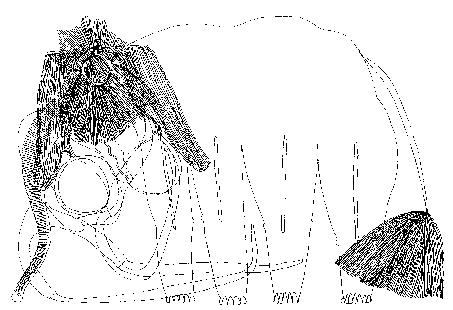
Sometimes differently abled people give you pictures, those pictures can help you to
better understand things.
But it is not easy. What does this picture, that I have been given by a differently abled
man in Denmark, tell us about his mental-pictures?
Another consequence of what happened is that I cannot longer handle to watch films with violence, such as "Silence of the lambs???" on the TV-set or in the movies. If this is good or bad I do not know. I just establish the fact that the occurrences on my second day at my new work still have an influence on my life.
We conclude this chapter with some thematic pages with pictures from the day-activity at "Tryckolera", where they are using Isaac to document relieving examples:
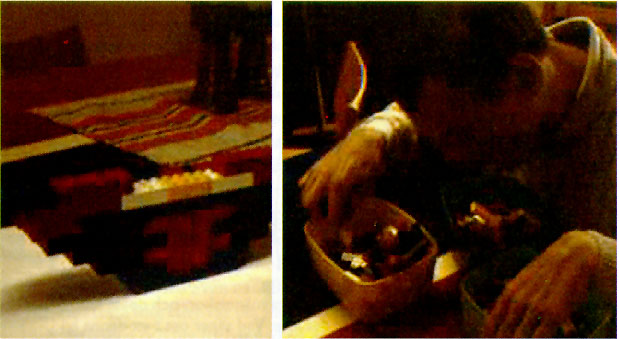
Lego.
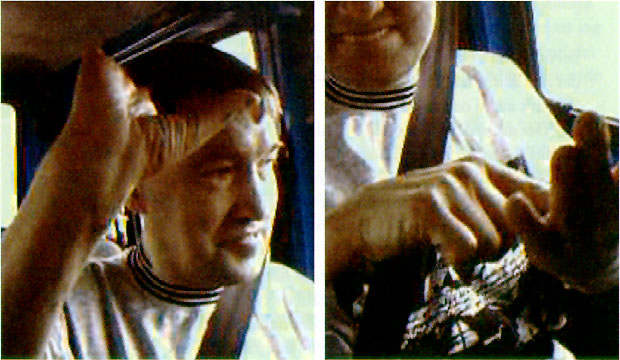
The hand levers for development.
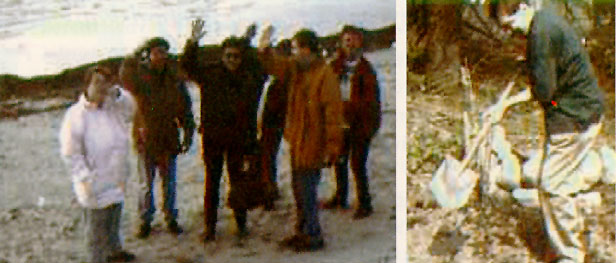
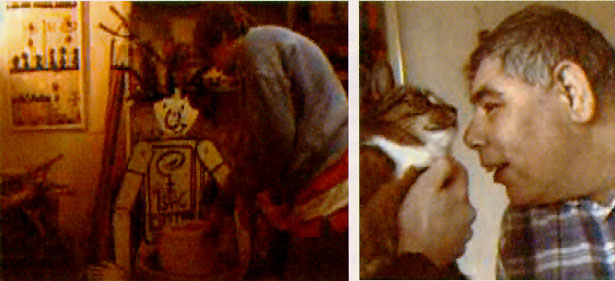
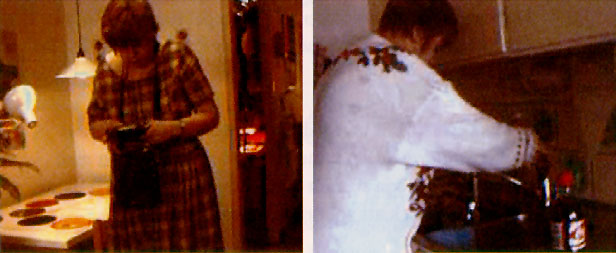
Picture documentation using Isaac.
The key-words and the key-thoughts of the chapterThe introduction of Isaac has brought forward a lot of concrete examples from the
every-day life. It is splendid because technique demands an insight into the concrete,
among other things, through examples described on the conditions and language of the
every-day life. Technique, for example expert systems, can be very good facilities to expose patterns
andshow closed structures you had not even started looking for. Examples can help you question the instructions you usually give. Examples can help you question how great the insight you really have into the person
whose world of thoughts you try to explain to the person itself. Examples can show you a situation where the perceptions of the differently abled can
have a better prognosis than other criteria for selection. It can be sufficient to document examples only in pictures. Yes, sometimes it even can
be superior to awaken new thoughts. Annika Ärvström's story focuses on relatives. It contains a pain so deep you almost have to protect yourself against it, even as an outsider. It is obvious that relatives need support. The story about Tobias is focused on empathy. You have to be something like an Einstein
of empathy to imagine Tobias' needs and wishes, and try to stand up to them. The story about the bite in Arne Svensk's cheek is about the personnel's need for a close relation to the person they are supposed to help, and a listening and a supporting environment. |
Next chapter: Future and history , or back to Table of Contents.